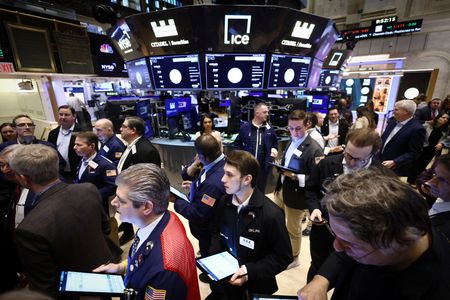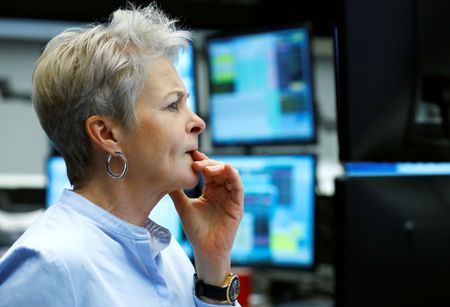By Chuck Mikolajczak
NEW YORK (Reuters) – A gauge of global stocks retreated on Monday after six sessions of gains while U.S. Treasury yields rose ahead of central bank policy announcements and data that may shed light on whether progress has been made in bringing down inflation.
Investors widely expect the Federal Reserve will raise rates by 25 basis points (bps) on Wednesday, with announcements on Thursday from the Bank of England and European Central Bank (ECB), both of which are largely expected to hike by 50 bps.
“The market has had a big run and the trading is a bit more cautious heading into a week which likely will be an inflection point for the overall market,” said Keith Lerner, co-chief investment officer at Truist Advisory Services in Atlanta, Georgia.
On Wall Street, U.S. stocks slumped, with 10 of the 11 S&P sectors closing lower, while Johnson & Johnson lost 3.70% after a U.S. court rejected the company’s plan to offload into bankruptcy tens of thousands of lawsuits over its talc products.
The Dow Jones Industrial Average fell 260.99 points, or 0.77%, to 33,717.09, the S&P 500 lost 52.79 points, or 1.30%, to 4,017.77 and the Nasdaq Composite dropped 227.90 points, or 1.96%, to 11,393.81.
The rate increase expected at the Federal Open Market Committee’s Jan. 31-Feb. 1 meeting would bring the policy rate to the 4.5%-4.75% range. That’s two quarter-point rate hikes short of the level most Fed policymakers in December thought would be “sufficiently restrictive” to bring inflation under control. But futures currently expect rates to peak at about 4.9% in June before retreating to 4.5% by year-end.
Markets will also grapple with a host of U.S. economic data, culminating in Friday’s payrolls report for January. Investors see signs of weakening in the labor market as a key factor in bringing down high inflation. Other data included gauges of the manufacturing and services sectors.
The U.S. corporate earnings season also rolls on, with earnings this week expected from Apple, Alphabet and Amazon. Earnings for S&P 500 companies are expected to show a decline of 3% for the quarter, according to Refinitiv data, weaker than the 1.6% fall seen at the start of the year.
Stocks in Europe closed lower, with rate-sensitive names such as technology shares among the primary decliners after inflation data from Spain came in above expectations while other data showed the German economy unexpectedly contracted in the fourth quarter.
The pan-European STOXX 600 index lost 0.17% and MSCI’s gauge of stocks across the globe shed 0.99%. MSCI’s index was on track for its biggest January percentage gain since 2019 while the STOXX 600 was poised for its largest January percentage gain since 2015.
U.S. Treasury yields rose ahead of the central bank meetings and economic data, with the 10-year yield up for a third consecutive session. Benchmark 10-year notes were up 2.6 basis points to 3.544%, from 3.518% late on Friday.
The greenback, which was poised for its fourth month of declines as expectation have increased the Fed was nearing the end of its rate-hiking cycle, was up for a third straight session against a basket of major currencies.
The dollar index rose 0.334%, with the euro down 0.17% to $1.0848.
The Japanese yen weakened 0.42% versus the greenback to 130.40 per dollar, while Sterling was last trading at $1.2345, down 0.42% on the day.
Crude prices fell ahead of the expected hikes by central banks and signals of strong Russian exports.
U.S. crude settled down 2.23% at $77.90 per barrel and Brent settled at $84.90, down 2.03% on the day.
(Reporting by Chuck Mikolajczak, additional reporting by Lewis Krauskopf; Editing by Bernadette Baum and Deepa Babington)



